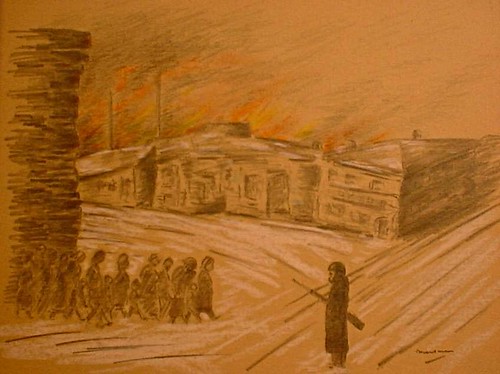
Heard a commentary item on the CBC yesterday on anti-semetism to mark Holocaust Memorial Day. While the topic is vital I don't agree with the way the argument was put. Essentially, Murray Teitel, the author, says that criticizing Israel is tantamount to anti-semetism by other means.
While those who rail against Israel may be anti-Semitic, I can't see how this is necessarily so and I also am puzzled that Mr. Teitel, a lawyer, would think so. Surely one can criticize the actions of a country's government because one genuinely believes that they are wrong.
I personally am no fan of the current Israeli prime minister Ariel Sharon. I find him to be swaggering, predatory, and opportunistic, not at all admirable or the man to lead Israel to peaceful co-existence with its neighbours. I am on the other hand a great admirer of a previous Israeli prime minister Yizhak Rabin. Nancy and I seriously considered naming our son Yizhak, after both the biblical and political figures. Where does that place me? Is one an anti-Semite if one is horrified at the continued suicide bombings by Palestinians yet also notes that many of the Palestinian children killed by Israeli troops were shot in the head or chest (i.e. probably not accidentally)? I think that the truth is that there's plenty of hatred to go around and that the painting someone as anti-Semitic for criticizing Israeli government policy is yet another foolish attempt to try to make black and white something that clearly is not.
Painting people with valid criticisms with the same brush as one paints true purveyors of hatred is illogical and has the effect of allowing those who really are anti-Semitic to hide amidst the resulting confusion. I think that an extra effect of aggressive arguments such as the one expressed by Mr. Teitel is to foster a sense of invulnerability amongst those in charge in Israel. This can lead to a weakened sense of accountability and an increase in ill-considered action.
Finally, the aggressiveness of Mr. Teitel's argument and its all-encompassing scope seems to me to put it push it away from the realm of the rational and toward that of propaganda. I don't trust propaganda from any source.
This commentary piece was made to mark Holocause Memorial Day. I wish we could do so with more clarity, for clarity and resolve are truly required to both remember the Holocaust and act on its lessons.
Looking at Wikipedia, I examined its section on logical fallacies. Mr. Teitel suggests that because other countries have committed horrible atrocities, those committed by the state of Israel are not significant. This would seem to be an example of a suppressed correlative fallacy. When Mr. Teitel suggests that since if you are anti-Semites you will criticize Israel therefore if you criticize Israel you must be anti-Semitic, he is using the fallacy of affirming the consequent.